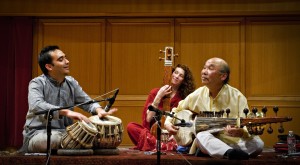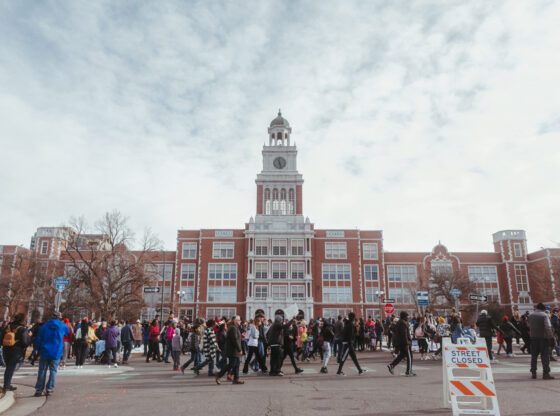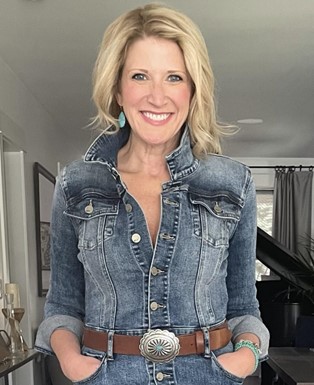
Saturday night, the Lamont School of Music showcased a performance of North Indian Classical music, performed by Steve Oda, Nabin Shrestha and Sarah Morelli. The Guest Artist Recital was held in the Newman Center’s Hamilton Recital Hall from 7:30-9:30 p.m., with tickets selling at $10 for non-DU students.
Inside the Hamilton Recital Hall, all eyes were fixed on the cultural magic unfolding before them. Three performers sat cross-legged on a raised platform, placed in the center of the low stage and covered with decorative carpets.
Oda and Shrestha sat across from each other at the front of the platform while Morelli, Assistant Professor of Ethnomusicology at the Lamont School, sat at the back.
Morelli, who specializes in the classical music and dance of North India, arranged the performance.
Although Oda has been a good friend of Morelli since her graduate years in 2000, he and Shrestha met for the first time just two nights before their Lamont performance. This spontaneous rendezvous left little time for the pair to prepare or rehearse.
However, according to senior Heather Salinger, a music and French double major from Concord, Mass., this wasn’t a problem since North Indian Classical music is 80 percent improvisational.
“Most of the time, that is the norm,” said Salinger.
Rebecca Moritzky, a junior from Lakewood majoring in music performance expanded on this.
“It’s really amazing because you can only play certain notes in certain ways,” said Moritzky. “But they were still able to find a lot of freedom.”
“If I wasn’t watching for it,” said Salinger, “I wouldn’t be able to tell at all that Shrestha and Oda were improvising.”
As Oda played the sarod, a 25-string instrument resembling the guitar, Shrestha accompanied with the tabla, a pair of percussion instruments resembling bongo drums, meanwhile Morelli provided the backbone with her tanpura, a four-stringed instrument also resembling the guitar.
While Morelli remained quietly in the background, Oda and Shrestha engaged in a very lively musical interaction, each improvising from the others’ rhythm.
“But it’s not random,” said Shrestha. “We are conversing; I ask a question with my tabla and he answers with his sarod. I listen for his beat to see what he is trying to convey and then I give my response. And we take turns. If it was composed, it would not work.”
Oda explained the connection felt between the two musicians the day of their first meeting.
“His feeling for the music is heartfelt,” said Oda. “And it matches what I like to convey, which is a heart-full appreciation for the melody.” The pair executed rapid complex sequences, building an atmosphere of intensity and awe.
During the break, Oda asked if there were any questions. Hands shot up. Guests inquired after the instruments’ components and the melodies being played. Oda answered them happily. His sarod was composed of chrome-plated cast steel, goat skin and brass, and carved from a single piece of Indian hardwood. The lower strings are plucked with a coconut shell pick while the fingernails, as opposed to the fingertips, are used to strum the upper strings, yielding the dream-like twanging characteristic of Indian music.
After the performance, the audience rose in a standing ovation while the performers stood and bowed thankfully with their palms in prayer form. Morelli, clothed in an elegant red salwaar kameez, invited the audience upstairs for a reception where they would have the chance to speak with the musicians. Guests flocked to greet and thank the performers for their demonstration. At this time, the musicians shared their personal backgrounds.
Oda, a third-generation Japanese-Canadian has been studying the sarod for over 40 years, under the tutelage of Ali Akbar Khan, one of India’s most celebrated musical treasures—and the guru who boldly introduced North America to North Indian Classical music, as this art form had been a carefully guarded secret in South Asian musical families.
Oda eventually switched careers to dedicate himself full-time to studying, teaching and performing. He currently resides near San Francisco.
Shrestha, a Nepalese native, began learning the tabla as a child. He’s studied the instrument formally at Nepal University and the Music University of Delhi. He resides in Colorado, persisting in his tabla studies but also recording, composing and offering private lessons.
Morelli, a Boston native and Harvard grad trained with Ali Akbar Khan alongside Oda for three years. Morelli has studied the performing arts of India since 1992 and now performs as a Kathak dancer, one of the six major classical Indian dances in which music, dance and mime are employed to narrate Indian legends and scriptures, and musical accompanist in the Pandit Chitresh Das Dance Company, a San Francisco-based company dedicated to the promotion, preservation and education of Indian culture.
On an educational level, Morelli arranged the performance in order to serve the Expanding Horizons and World Music, two of the event’s donors, philosophy of nurturing diversity in musical offerings, both for the University and for the greater community. But on a personal level, Morelli shared her deep admiration for her good friend.
“Part of it was honoring Oda’s place in Indian Classical Music history,” said Morelli. “He’s taken the music in heart, mind and soul. His sense of tuning is so refined; he talks so much about tuning into the notes as a way of opening the heart. He’s part of Khan’s legacy to spread North Indian Classical music to the rest of the world.”
Oda’s closing comments expressed the humble goal he wished to fulfill in the performance.
“I hope that some aspects of what we did were able to touch your heart,” said Oda. “And if it did, even a tiny bit, then we are happy.”











